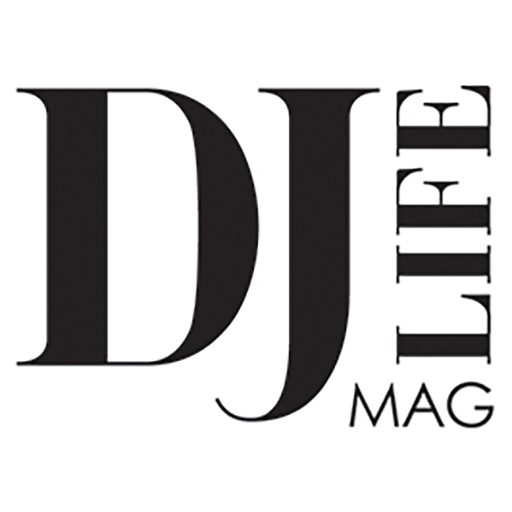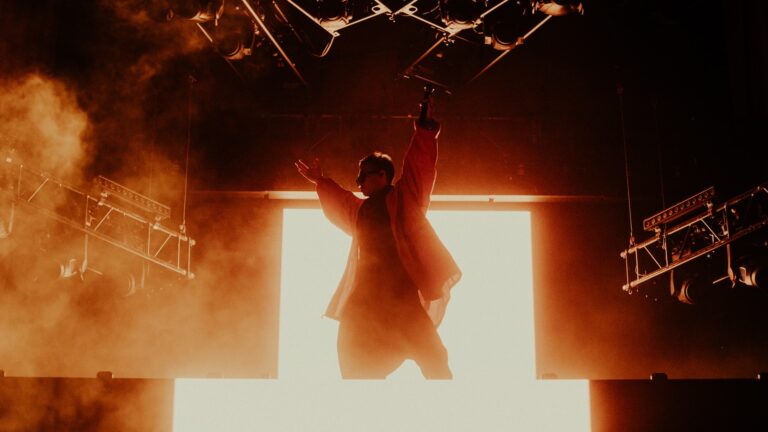For His Upcoming Album and Tour, EDM Sensation ZHU Turned to a Hometown Landmark for a Dose of Unique Inspiration.
Steven Zhu has spent the last decade working his way to the top of his musical craft and, by most measures, he’s certainly succeeded. What first began as a mysterious project from an upstart artist has, in a few short years, become an electronic-music mainstay.
Known simply to EDM fans as ZHU, San Francisco-based DJ/producer/vocalist/instrumentalist first exploded onto the scene in 2014 with his massive single “Faded.” Since then, he’s evolved into a mature, in-demand name on the club and festival circuits. Over the years, he’s garnered chart success, a Grammy nomination, and in addition to his standalone singles, EPs, and mixtapes, has released three studio albums: Generationwhy (2016), Ringos Desert (2018), and Dreamland (2021). And now, it’s time for ZHU to enter his GRACE period.
Slated for official release on Astralwerks in late January, ZHU’s upcoming studio album, GRACE, will be a collection of tunes inspired by San Francisco’s Grace Cathedral, a historic, art-rich Episcopal church in the city’s Nob Hill district. This past September, ZHU released four LP tracks – “Take My Soul,” “Blind Believer,” “Devil’s Prescription,” and “Days Before Grace” – ahead of the official album drop. He also began a supporting tour that will run through mid-November.
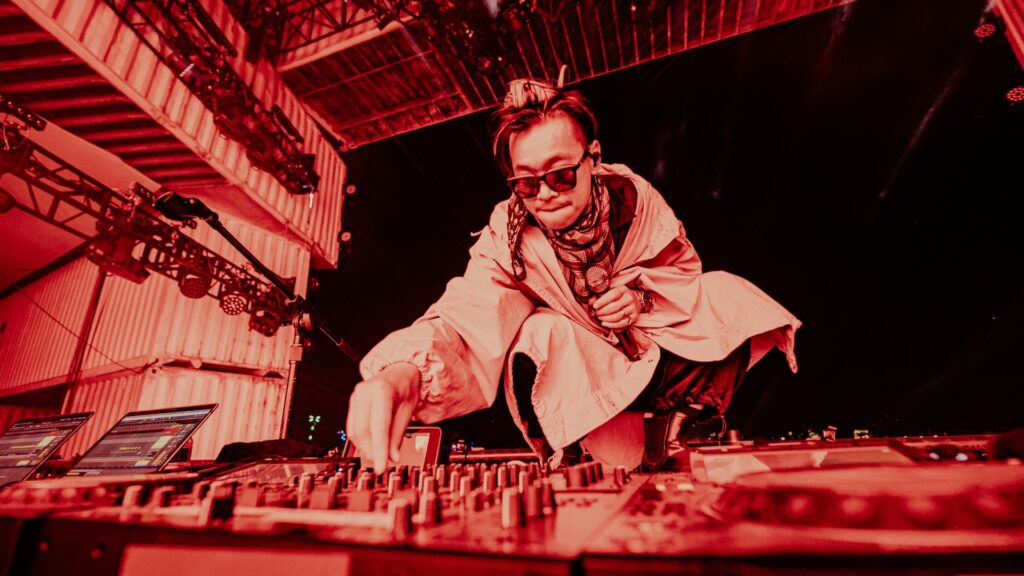
As an experience creator, ZHU’s extensive discography spans the course of a decade, and with each of his EPs, mixtapes, and albums, ZHU’s coinciding live shows always find a way to reflect the themes found within each body of work. And this time, for the GRACE period, while quite conceptually different from the others, the gigs will once again deliver a different aesthetic and overall atmosphere, he says.
With ZHU, it’s so much more than just your typical DJ set. There are live vocals from the performer, and it’s usually an interactive experience that goes beyond expectations. In November of 2022, at ZHU’s tenth sold-out show at Denver’s fabled Red Rocks Amphitheatre, he dazzled the crowd with sound, lighting, video and more. During the set, fittingly following the release of his Musical Chairs Mixtape (Vol. 1), ZHU’s vision included a set-up of a large-scale game of musical chairs. Consisting of illuminating gold-lit chairs, the effect required hundreds of Martin Rush PAR 2 Zoom fixtures stationed under 260 clear, plexiglass chairs onstage.
This followed ZHU’s set at Electric Daisy Carnival in Las Vegas that May when he put on a full-blown fashion and runway show at the circuitGROUNDS stage. Considering a set that included two of his thematic tunes, “Mannequins & Egos” and “Cocaine Model,” it was rather fitting. The event, of course, was also a great opportunity for ZHU to showcase his fashion line, NIGHTDAY.
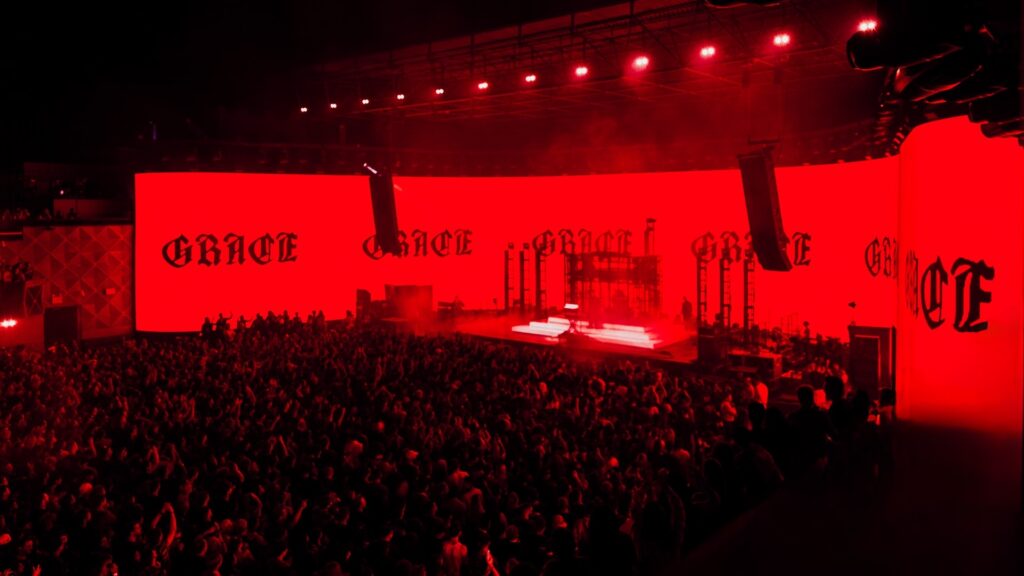
DJ LIFE sat down with Steven Zhu just after the start of his GRACE tour, and here’s what the talented artist had to say…
DJ LIFE: How and when did you first begin exploring music? Was this something you always knew you wanted to do?
ZHU: For me, when I was young, I was a kid who needed stimulation. So, my mom sat me down and she said, “You’ve gotta go try to play piano.” I was playing piano when I was young and I think when playing other people’s stuff, I realized I didn’t like copying everybody else. I found that I was wanting to change notes here and there. From there, I started to play more instruments and that led me to eventually, with technology, be able to compose, make tracks, write songs, and produce. That’s the point when I was able to put together a vision from my mind.
DJ LIFE: Aside from playing instruments, what came first for you? DJing or producing?
ZHU: Production was the first thing. I grew up listening to bands and hip hop, and then rave culture came to me a little bit later. Writing and putting together beats was the first thing that I’d ever done. I used to make beats for other people and make tapes. That was actually the first way I was able to get my music heard.
DJ LIFE: Did you always perform or produce under the name ZHU, or were there other stage names you’d considered or went by?
ZHU: I never really had any other stage names. I may have had a couple of different bands that I would dabble in, but none of them were super-serious. People called me Zhu – you know, there’s a lot of Stevens. People just tend to call me by my last name and that just kind of stuck.
DJ LIFE: What did your early DJ setup consist of? What’s your current DJ setup?
ZHU: When I’m DJing, I’m on the Pioneer DJ CDJ-3000s. When I’m DJing, specifically, it’s quite different from when I do a live show. So, when I DJ, I pretty much only spin on [Pioneer DJ] CDJs.
DJ LIFE: Do you have any memorable or standout moments from when you first started playing DJ sets?
ZHU: Yeah! Really, really early on, there was a festival [in Dallas] called Lights All Night. They ran a contest, and you could submit a track and basically the winner of the contest [for best track] got to play a set there. I’ve actually never told this story before because it was super-early [in my career]. I submitted a track, and I won. I went to go play a set and there were maybe 10 people there. This is way back, before I had even put out any music of my own under ZHU. I remember walking around in what was pretty much an industrial shed. I [also] remember just looking around, thinking to myself, “I’m gonna be back!” So, that’s actually a really early, inspiring moment, that I’ve never really told anybody because winning a contest wasn’t something that comes up in a casual conversation [laughs]. Looking back, I think that was a memorable moment for me. I don’t even know if any of those people [there] actually remember anybody that they saw at that time.
DJ LIFE: What does your production set-up consist of? Do you have a studio or tend to make most of your music on the road?
ZHU: I do all of it! I have a studio, but I also travel and like to make ideas. I feel like I’m a Logic person. I do use Avid Pro Tools and Ableton Live, but I’m a Logic person and I do most of my work in Logic. I’m kind of a sound designer, and I think that as I’m making music, instrumentals, club tracks, and stuff like that, for me, I’m primarily a drums and drum-and-bass-first guy. That’s when I’m doing something like that, but obviously as I’m expanding the way I’m writing music. Especially on this particular project [GRACE], a lot of stuff is done on keys and guitar first, and then going backwards and producing.
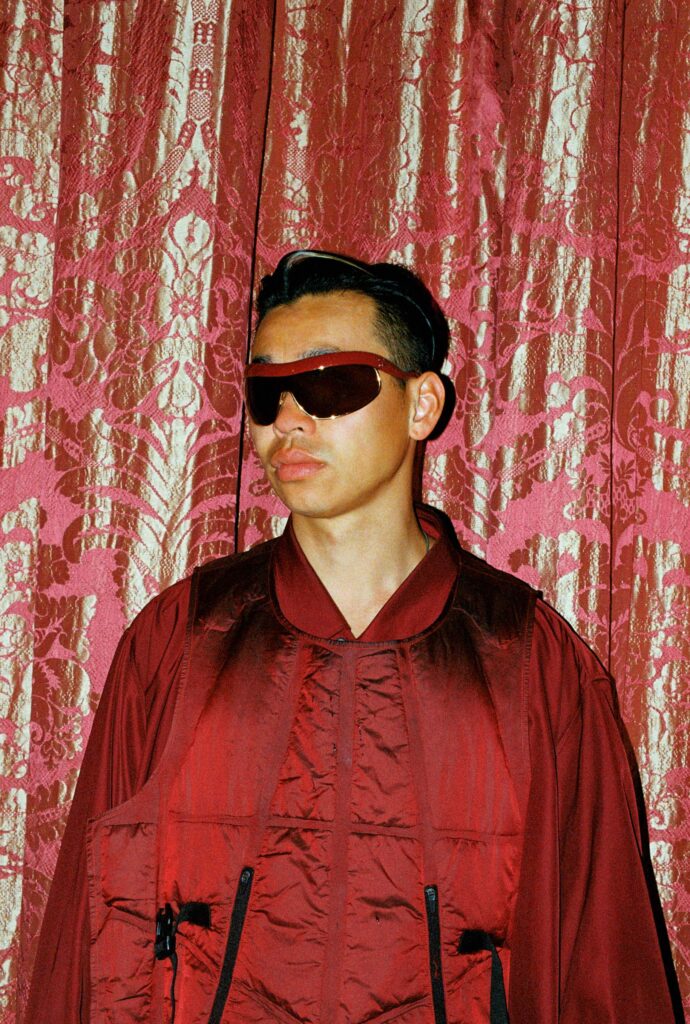
DJ LIFE: That said, let us dive into the GRACE period. The album was recorded at the Grace Cathedral in your hometown?
ZHU: Yes, a majority of the album was done at the Grace Cathedral [in San Francisco], especially in terms of the sound and all of the sound capturing.
DJ LIFE: Is that the reason behind the GRACE album title?
ZHU: There’s actually a couple of different reasons why GRACE, but that is one of them. San Francisco, for me, is a place where a lot of inspirations came from early on, musically…. historically, and also for me being in this sort of “gothic” cathedral with so much history. I think, sonically, I very much wanted to capture that. I don’t think that that sound has really been done in that way.
DJ LIFE: Did working at the Grace Cathedral inspire the music on the album itself?
ZHU: Yeah, absolutely! From the architecture to the marble concrete columns, the reverb, etc. I mean I could really go deep, but the way that I hear it there and the way that even the drums sounded there. It really does have its own essence that I don’t think you can sit in a bedroom and imagine it, never mind replicate it.
DJ LIFE: How long were you working on GRACE? What’s the typical track-selection process like for you when constructing an album, as opposed to your EPs and mixtapes?
ZHU: I think a ZHU album is tedious. I think a ZHU album is also something that, in real-time, gets changed all the time. I’m still working on the album now as I’m having all these different ideas, trying to perfect things, understanding how it’s going to translate live, and what will work here and there. If we were living in the ’60s and ’70s, [the album] gets pressed and it’s put out, so you don’t really get to change much. But today, which to be honest might not be such a good thing, is that you can change things so much. Part of me wants to set it in stone, and that’s why going into the cathedral gave us a limited amount of time. I think it’s kind of important to let the clock run down and be able to be at peace. However, for this particular project, the clock is still ticking.
DJ LIFE: Some artists look back and wish they could change things, while others feel what’s done is done. Would you say you’re more like one type over the other?
ZHU: I think, as a producer and as a person who’s obsessed with sound engineering, yeah, there are a bunch of records that I feel could be updated. But, as an artist, I think my job is to capture the moment and capture the energy of that time, my generation and my surroundings, the message, and the culture around me. So, I don’t feel like that should be tampered with because that’s what makes great records great, too. It’s because they were very much intentional in that moment.
DJ LIFE: You’ve recently embarked on your GRACE tour, which coincides with the new album. What can you tell us about the tour itself and how it differs from some of your past shows?
ZHU: Recording in the cathedral and having been there, I tried to take a chunk of that energy and bring it around [into the show]. I wanted to give a sneak peek into what this world – sonically and aesthetically – was going to be. For this tour, I have a band with me, and I feel like it sits in an electronic world, but it’s very much human. There are human beings playing instruments. I’m performing. For me, this is kind of taking control of being personal with all of the different technologies that we’re capable of using. Day in and day out, I like the raw stuff and I like that there are mistakes; I like that things are different night in and night out.
DJ LIFE: While on the live-show aspect… your sets are often an experience that showcase your creativity as an artist… from a runway and fashion show at EDC Las Vegas to the biggest game of musical chairs. How do these out-of-the-box ideas come to fruition and how are they executed?
ZHU: So, for EDC Las Vegas, I’m working on the fashion line NIGHTDAY. All throughout the pandemic, we were kind of forced to do these remote live streams and stuff like that. We even did one in a warehouse where we had these models with no audience. For me, fashion has always been a big influence, in terms of the aesthetic and presentation of my music. I feel like, even going on the early tours, I was always investing, trying to upgrade merch, and just give a better product to my fans. At that time, even in 2016, it’s not even close to what electronic artists and DJs are trying to curate on that level, and I feel like I was one of the early few people to really kind of try to bring fashion into our scene. I wanted people to take a look and realize that these kids and these artists have influence and they have a style. I didn’t really like the way that the general public was perceiving dance culture. Now, I think a lot of artists are kind of intentional about their designs, the quality, and all of those things. Those are the things early on that I did care about, so for EDC, I wanted to put a runway into my festival show and really show that it is possible.
DJ LIFE: You developed a signature sound that’s been distinct from the very beginning. Which artists first inspired you?
ZHU: I think very early on, a couple of artists that I looked at as super-unique and inspiring were deadmau5 and Justice. Then, there were bands like Massive Attack and Portishead. In terms of electronic music, those acts, to me, sounded like nobody else. Obviously, people have copied and emulated, but they were the first to really do things in a way that really felt original.
DJ LIFE: You first exploded onto scene with “Faded” nearly a decade ago. It went on to receive a Grammy nomination and catapulted your career. Did you expect that or know before releasing the song that it was going to be the one to jump-start your career?
ZHU: I mean, I do think that we knew people loved the sound, but we didn’t know how far it would go or that it was going to travel around the world. We also didn’t know how quickly it was going to take off. I remember one week we had sent the record over to Triple J [Australian Broadcasting Company] – this was very early on, and it was also self-funded, you know? At that time, there was no label; it was the SoundCloud and Hype Machine era. I think me and my team were sort of like: “Well, we have one shot, so let’s test this at radio.” Basically, a week went by, and nothing happened [laughs]. We had just spent all this money, so we were like, “Is this a thing?” And then immediately onto that, I think it was the following week, it was added. It went No. 1 on Triple J and then crossed over to Nova. It felt like within 24 hours it went from absolutely nothing to… this is a hit – in Australia! From there, it went around the world – and that journey around the world probably took me about a year and a half to get back to America. People in the scene knew [about the song], but the average person probably hadn’t heard “Faded” until about a year or so later.
DJ LIFE: When that song became such a big hit like that out of the gate, did you feel any added pressures at all when it came time for a follow-up?
ZHU: Definitely! I feel like at that time I had experienced raves, and I was very much in tune with how I wanted people to move to music. But at the same time, I was also inspired by Pink Floyd and Zeppelin, so there were a lot of things that I knew I had to offer. I didn’t want to purely make another club track, and that’s it. But at the end of the day, dance fans were the first ones to embrace me, and I have a lot of appreciation for them. At the end of the day, I think making people move is a core of what I do. Was there pressure? Yeah… but I think I like that, and I liked kind of being in the moment in terms of being able to have the pulse on kind of making what’s next.
DJ LIFE: As an artist who also tends to also sing on their own tracks, would you say it’s easier to write and record your own vocals than it is to rely on other writers and vocalists for toplines?
ZHU: In the beginning, nobody wanted any of them. I had made all these tracks; I had made all these demos – and nobody really wanted to cut anything. So, with SoundCloud and blogs at that time, it was easy to upload stuff. A lot of the early songs were songs that I wrote and was imagining other people cutting it, you know? But I just put them out, and people liked it; they really fucked with it. It came out of necessity, but it also came out of the fact that I had no other choice. Because of that, I started perfecting my voice, trying to produce around it, trying to replicate it, and get better at using my voice. Obviously, I still like other people’s voices on my tracks because I do think there are some things I sound good but, there’s some things that I don’t. I like a variety of different textures on my projects, but I’m usually the person who comes up with the idea and executes those visions. Then, maybe I’ll find somebody who can either do it better than me, give a better take or even just a different take.
DJ LIFE: If you could play a back-to-back DJ set with any other DJ who would it be, and why? How about a collaboration?
ZHU: Honestly, I think it would have to be with deadmau5. We’re doing some shows together, but we’re not doing any back-to-backs. I just think that he inspired that early progressive sound that has been a big influence on a lot of producers. In terms of collaborations, I would have to say Sade because she’s one of my favorite artists, so it would be dope to have her vocals on something.
DJ LIFE: Is there something you can share with fans that might surprise them or that they don’t already know about you? Any hobbies you can share outside of the music space when you aren’t consumed by music?
ZHU: I grew up being a huge basketball fan, and I feel like there’s a lot of similarities when you’re playing, in the flow of the game and that stream of consciousness when you’re DJing, too. It’s very fluid because you’re reacting and proactive at the same time… if that makes sense.
DJ LIFE: What advice would you give to aspiring or up-and-coming DJs that you wish you would have gotten early on in your career?
ZHU: Even to this day, I still try very much to give feedback. I think don’t really care too much about what other people think earlier on. Stick to the stuff that makes you want to do this… not just as a career, but as a life choice. Because at the end of the day, if you end up not liking it, loving it, or burning it, then you’re just never going to get to that point where you put in enough hours where you’re great at it. I think that’s the thing where, early on, I had people pulling me this way and pulling me that way, telling me: “You should do this, you should do that.” I think I kind of fought a lot of people and I still continue to fight people all the time about what things should be. So that’s definitely something I would tell a new artist because they have a vision and everybody else is just there to help mold it or put it into place, but the vision has to come from them.
DJ LIFE: Where do you see yourself five years from now?
ZHU: I feel that this project is a project that gives a story of me in a club atmosphere, me in a performance atmosphere, and me as a storyteller. I think this is kind of, to me, a comprehensive phase for me. A lot of my fans up until recently didn’t know that I did the vocals or sang on my songs until they saw me do it. I think because of the nature of how my career started and with people not knowing, it was very mysterious. They don’t know that I’m involved in so many aspects of the project to the degree that I am, and I think I want to just be able to tell more stories as I venture into this part of my career.

